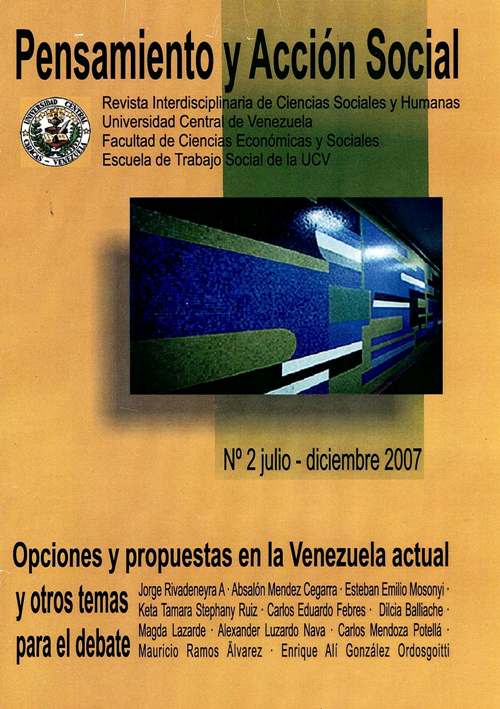Ciencias sociales y humanas: su enseñanza universitaria frente a los retos de la diversidad y la interculturalidad
Palabras clave:
Antropología crítica, interculturalidad, saberes milenarios, Critic anthropology, multiculturalism, ancient knowledgeResumen
Para desbrozar el camino prefiero dar cuenta de un problema de orden epistémico en nuestro ambiente actual de país transformador y revolucionario. No faltan voces que se hagan eco de la existencia de una antropología colonialista y alienante, lo cual ciertamente no ha muerto ni carece de representantes influyentes en Venezuela y América Latina. Es hasta fácil proclamar que este tipo de antropología puede hacer muy poco a favor de los pueblos indígenas y de las culturas populares, para poner dos ejemplos bien evidentes. También es un secreto a voces que sólo en fecha reciente ha surgido una verdadera preocupación por la planificación, divulgación y enseñanza de los idiomas indígenas, por la clara orientación teórica y descriptiva de años anteriores. Si esto fuera toda la verdad, no habría tal vez mayor razón para fomentar el bajo perfil de este tipo de actividades académicas. Vale decir, la antropología y la lingüística. La antropología comprometida con los pueblos indígenas y sus luchas en épocas muy recientes a mediados del Siglo XX, una antropología crítica que pregona el Grupo de Barbados del cual formamos parte desde su fundación en 1971 y otros numerosos grupos adherentes latinoamericanos. Una Venezuela dinámica, renovada y dueña de su destino requiere una Venezuela plural e intercultural y con justicia social en la cual la formación académica universitaria al más alto nivel requiere un reposicionamiento y una apertura a los saberes milenarios, perspectiva ésta que planteamos hace más de cuarenta años. A la luz de los recientes sucesos sociopolíticos y étnicos en América Latina es justo plantear que el camino andado no ha sido en vano. Hoy se expresa en Constituciones como la venezolana de 1999, la colombiana de 1991 la de Brasil de 1988.
Abstract
In order to clear the way I prefer to give account of a problem of epistemic order in our present atmosphere of transforming and revolutionary country. They are not few voices that support the existence of a lolonialist and alienating anthropology, which certainly has not died nor lacks of influential representatives in Venezuela and Latin America. It is rather easy to proclaim that this type of anthropology can do very little to favor the indigenous towns and the popular cultures, to set two evident examples. Also it is an open secret that only in recent dates there has arisen a real preoccupation by the planning, spreading and teaching of the indigenous languages, by the clear theoretical and descriptivist direction of previous years. If this were all the truth, it would not be greater reason to foment the low profile of this type of academic activities, like anthropology and linguistics. The anthropology jeopardizes with the indigenous towns and their fights at very recent times in the middle Twentieth Century, a critical anthropology that announces the Group of Barbados of which we formed part from its foundation and other numerous Latin American adherent groups. A dynamic Venezuela, renewed and owner of its destiny require of a plural and intercultural Venezuela with social justice in which the university academic formation at upper level requires a new position and opening to ancient knowledge, perspective that we raised more than forty years ago. To the light of the recent sociopolitical and ethnic events in Latin America its right to sustain that the walked way has not been in vain. Today this is expressed in Constitutions like the 1999 Venezuelan, the Colombian of 1991 and the one of Brazil of 1988.

